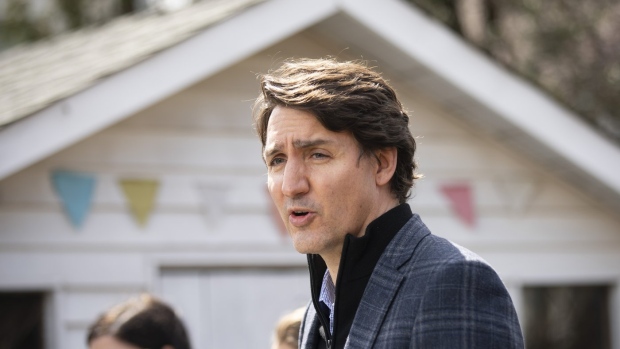Prime Minister Justin Trudeau says he wants to make it easier for more Canadians to drive electric vehicles and he isn’t ruling out nuclear power as a cleaner source of energy.
Trudeau said electric vehicles help cut pollution, but often are too expensive for many Canadians.
“We know we need to cut emissions,” he said Monday at an outdoor news conference at Royal Roads University in the suburban Victoria-area community of Colwood.
“We know we need to reduce pollution and one of the best ways of doing that is to get more clean cars on the road.”
Last week’s federal budget placed an emphasis on transitioning to the green economy, which included expanding the availability of zero-emission vehicles and charging stations, Trudeau said.
The federal government will extend a program that offers electric vehicle buyers up to $5,000 to help with purchases and it will introduce mandatory sales targets that require 20 per cent of all vehicles sold by 2026 to be electric, he said.
“We know electric vehicles are more expensive up front, even if over the long term they turn out to be cheaper,” said Trudeau. “We know people need that help up front.”
The sales target program will expand over the coming years, said Trudeau, with 60 per cent of vehicle sales being electric by 2030 and 100 per cent by 2035.
The 2022 budget includes $400 million over five years to expand charging infrastructure.
“The investment in this budget is going to allow for thousands more (charging stations),” Trudeau said. “We know that that is a key path forward in helping families make that final decision to switch to electric.”
Trudeau said Canada must also embark on more electrification initiatives, including the possibility of increased nuclear power.
“It’s very clear, first of all, that we need to reduce our emissions, we need to reduce our dependence on oil and gas,” he said. “If we didn’t already know that, the conflict in Ukraine right now with Russia’s illegal invasion is emphasizing just how much we need to be able to find cleaner sources of energy for our communities, for our country.”
Trudeau did not expand on the possible expansion of nuclear power in Canada, saying, “Nuclear’s on the table, absolutely.”
A spokeswoman for a Canadian clean energy think tank said five per cent of Canada’s vehicle sales are already electric models, with B.C. at 13 per cent.
Merran Smith, executive director of Clean Energy Canada, said recent data suggests 80 per cent of Canadians are open to considering an electric vehicle.
“Despite the high sticker price of an EV, the fuel and maintenance savings are so significant that the EV version often comes out tens of thousands of dollars cheaper,” she said at the news conference. “That’s the future.”
About 50 protesters opposed to COVID-19 restrictions were at Victoria City Hall before Trudeau was meeting with Mayor Lisa Helps.
Earlier, the prime minister said he often draws protests in Victoria from “a few people expressing their concerns about some issue.”
Also Monday, Trudeau paid a surprise visit to Canada’s women’s soccer team, which won the gold medal in last summer’s Olympics, ahead of their match Monday night against Nigeria.
“I thought I’d let Justin deliver tonight’s pre-match speech,” said coach Bev Preistman as Trudeau walked into the area where team members were doing stretching exercises.
Trudeau congratulated the players and said the team’s accomplishments are helping keep girls playing sports into their teens.
“It’s good to see the men`s team finally starting to catch up, because you guys are leaders,” said Trudeau, referring to the men’s recent qualification for the World Cup.
Finance Minister Chrystia Freeland started her post-budget tour of the country in Montreal on Monday, saying she started there because the city represents three themes in the budget: the green transition, an innovation economy and fiscal responsibility.
A protester interrupted Freeland’s media availability and called her a “warmonger.”
Freeland linked the war in Ukraine to the government’s decision in the budget to move ahead with a publicly accessible registry that would reveal the assets owned by anonymous Canadian companies, including expensive properties.
One of the reasons the government was moving faster on the registry was to ensure that people like sanctioned Russian oligarchs can’t hide their assets in Canada, Freeland said.
“Events in the world and also in Canada have drawn, rightly, attention to this issue,” Freeland said as she prodded provinces and territories to work with Ottawa on the measure.
“I think that Canadians would all agree that we need to know who owns Canada, and we need to know what money is flowing into assets in Canada.”
































